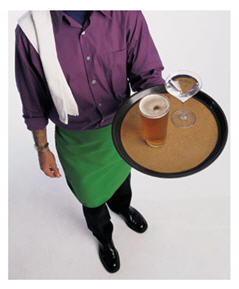The voice startled him. “I have bad news,” he said.
 This, in the wake of the recent loss of his sister, and a friend, and another battling a life-threatening illness. He must have felt his entire body stiffen at those words, though they were uttered by a waiter in a family restaurant, on the first night out with his wife in months.
This, in the wake of the recent loss of his sister, and a friend, and another battling a life-threatening illness. He must have felt his entire body stiffen at those words, though they were uttered by a waiter in a family restaurant, on the first night out with his wife in months.
What now?
Had the chef slipped in the kitchen and split his head open? Was he lying on the floor in a pool of blood between the double oven and the grill, and did it happen while preparing his cedar plank salmon? Would he have to speak to the widow, personally?
I can only imagine my friend’s brain racing through the possibilities at the delivery of those words: bad news.
Bad news
“What is it?” he asked.
The young man shuffled for a second, then stammered: “W-w-we’re out of Caesar d-dressing, Sir. I’m s-s-so sorry.”
My friend quickly dispatched the waiter with a request for oil and vinegar, told him not to worry, and likely leaned back and took a long sip of his martini. And a deep breath. His email account to me of this episode was not without appreciation for the humor in the situation. The frightened expression, the seriousness of tone, and of course the difficult delivery of those two words we dread, particularly as we get older.
Beneath the wry retelling of this tale lies the reality of my old friend’s past year, one that has brought too many tragic events, and with them, behind a stoic mask, great sorrow.
Hardship versus tragedy
Children immediately cover their ears when they don’t want to hear something. If only we could do the same, as adults, when hard times hit. If only that would “make it all go away.” 
Instead, we’re expected to don our stoniest expressions and cope. So we do. But hardship is not tragedy, and even tragedy is relative.
When death comes suddenly, there is no chance to make amends if a relationship is in disarray; there is no moment to say goodbye. Is that worse than dealing with a loss in which there is time to prepare? I have no answer; my own losses have been many, and each, without warning.
Perspective
The death of a child is grief beyond imagining; the passing of an adult pales in comparison. The passing of an adult in his or her prime is more tragic than the loss of one who has lived a long, full life.
A hierarchy of tragedy? Of course, though most of us don’t like to think of it, much less put it into words. But grieving is personal and lonely; it bears its own timetable, requires its own path, and unleashes uncanny destructive reach. For some of us, we don’t ever achieve “closure,” that word tossed about so glibly, as if it’s one more brass ring to be grabbed on the merry-go-round of life.
In the shadow of tragedy, hardship lightens; it offers the possibility of battling back, even in the face of onerous obstacles. If not within grasp, weapons to fight remain within view. Essentials come into focus: love, health, kindness.
 Kindness
Kindness
Sometimes an act of kindness is as simple – and extraordinary – as a phone call from a friend when you’re feeling down. Or an email. Or a cup of coffee, a quiet dinner, a chance to talk when your world is unraveling.
Then our perspective broadens, at least for a while; we recognize angels, in each other. We find respite in a smile, a story, an opportunity to be heard. In the everyday moments and memories we share with our children.
And we keep going.
© D A Wolf
Thank you. This lifted me.
Well said. Heartfelt and true. I often say that I must cherish the good moments that occur between the more regular bad ones!
So true… a friend is staying at our house right now and is going through a major hardship. I was surprised by my reaction to it- it all made me so uncomfortable. I use humor and food (are you hungry? how about a cup of tea?) to cope with it.
Kindness, that is what gets me through. Someone who listens and understands. And if we stay open an angel will enter our life when we need it most.
Ditto to the comments above…especially Cathy’s.